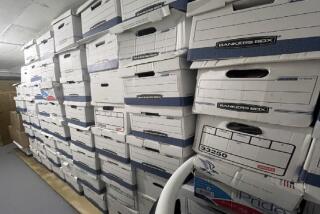Trump search inventory shows empty folders marked ‘classified,’ mixed top-secret and unclassified items

The list unsealed Friday provides a detailed accounting of what the FBI found at Mar-a-Lago.
- Share via
WASHINGTON — Twenty-seven documents with classified and top-secret markings were recovered from former President Trump’s office at his Mar-a-Lago estate in Florida, according to a detailed inventory of what the FBI removed during its court-approved search of the home last month.
The eight-page inventory detailing more than 10,000 government documents removed in the search includes the location where each item was found and whether it was classified, but not the subject matter. In many cases, highly classified materials are listed as having been stored in the same boxes as hundreds of unclassified items, including newspaper and magazine clippings and clothing.
For the record:
3:27 p.m. Sept. 2, 2022An earlier version of this article said that of the 26 boxes removed from a storage room at Trump’s Mar-a-Lago estate, 26 documents were marked confidential and 34 were marked secret. Twenty-eight documents were marked confidential and 37 were marked secret.
2:29 p.m. Sept. 2, 2022An earlier version of this article said that former President Trump and his legal team objected to the release of the inventory list. They did not object.
Among the boxes were 48 empty folders marked with a classified banner. Those empty folders could be of particular concern as the Office of the Director of National Intelligence assesses the risks to national security that could result from disclosure of the contents, because it could be difficult to determine what information might have been inside and where it is now.
Trump’s lawyers demanded more information about what was seized from the Palm Beach estate as part of their request for a judge to appoint a third-party special master to review the items. Neither his lawyers nor the Justice Department objected to making the inventory public.
U.S. District Judge Aileen Cannon of the Southern District of Florida ordered the unsealing of a status report on the Justice Department’s investigation as well as the detailed property inventory Friday morning.
Cannon is still weighing whether to appoint a special master to determine whether some of the materials are covered by attorney-client privilege. Trump’s team also wants a special master to decide whether the former president can claim executive privilege over the documents.
The Justice Department has objected to the appointment of a special master, saying that would delay its investigation and hinder a national security review by the intelligence community. The department also contends that because the documents belong to the government, Trump, as former president, cannot claim executive privilege.
FBI agents removed more than 100 documents containing classified information — including some marked top secret and meant to be available only in special government facilities — from the Trump estate during their Aug. 8 search, along with over 30 boxes of materials including thousands of government records.
FBI investigators are probing potential crimes, including violations of the Espionage Act and obstruction of justice.
Identifying what was in the empty folders marked classified and where the information is now should be a priority, said Rep. Sean Patrick Maloney (D-N.Y.), a member of the House Intelligence Committee.
“Why are there folders that contained classified information that are now empty? Where are the documents?” Maloney said. “Those questions need to be answered.”
Without knowing more about the folders, it is difficult to say how alarmed intelligence officials might be, Maloney said.
They could be the type of generic folders in which confidential information is transported within the White House, or they could be folders from intelligence agencies that provide details about the sources of the information, the date it was collected and broad descriptions of what it is about, said Larry Pfeiffer, a high-ranking CIA officer in the George W. Bush administration and senior director of the White House Situation Room in the Obama administration.
“If there were any meticulous records that were kept by the staff secretary, executive secretary or the [director of national intelligence’s] presidential daily briefing staff, they may be able forensically to figure out if there are any missing documents,” Pfeiffer said.
That 48 classified documents could be missing is the “worst-case scenario,” he said.
“That’s terrifying, because then what happened to them? Where are they? Are they still hidden somewhere? Are they hidden in another Trump location? Did he give them away to some people as souvenirs? God knows,” Pfeiffer said.
The list gives the fullest picture yet of the scale of what was recovered from Trump’s Florida estate. The search warrant instructed agents to take all items found stored with materials with classified markings, and in many cases they found materials with the nation’s highest security restrictions mixed in with unclassified materials.
The seven boxes taken from Trump’s Mar-a-Lago office contained three documents marked confidential, seven marked top secret and 17 marked secret, all commingled with at least 1,467 government documents or photos without classification markings; 43 empty folders with classified banners; and 28 folders labeled “return to staff secretary/military aide.”
Also in the office boxes were 99 magazine, newspaper or press clippings dated between January 2017 and October 2018, and 26 clippings dated between January 2020 and November 2020.
An additional 26 boxes removed from a storage room contained 28 documents marked confidential, 11 marked top secret and 37 marked secret, commingled with at least 9,274 government documents or photos without classification markings; five empty folders with classified banners; and 14 folders labeled “return to staff secretary/military aide.” The boxes also held hundreds of news articles, clothing, gifts and books.
According to the investigation status report issued earlier this week, the FBI had completed its initial review of the recovered documents.
Materials flagged as potentially being subject to attorney-client privilege were not reviewed. Items marked classified have been segregated from the other materials and are being stored separately.
More to Read
Get the L.A. Times Politics newsletter
Deeply reported insights into legislation, politics and policy from Sacramento, Washington and beyond. In your inbox three times per week.
You may occasionally receive promotional content from the Los Angeles Times.











